Unit 5 Section A 课件设计
七年级英语下册 Unit5 SectionA课件 人教新目标

Where is he? What’s he taking?
What’s he waiting for? What’s he reading?
Who are Ben and Tim talking to? What are they talking about?
Where are they all going? What’s the man doing?
Can you guess what the people are doing.
Is Nancy doing her homework?
No, she isn’t. She’s writing a letter.
Is Tom……?
Yes, he is./ No, he isn’t. He’s ……
Exercise
返回
用所给单词适当形式填空
1.Look! Some boys _a_r_e_s_w_im__m_in_g_(swim) at the pool.
2.Listen! Who _i_s_s_in_g_i_ng____(sing) in the room?
3.It’s nine o’clock, The students __a_re__h_a_v_in_g___ (have) classes
Mike
Look at the picture, and fill in the blanks.
Dear Bob,
Here is a photo of my family.
In this photo, I’m doing my homework. My father is _w_a_tc_h_in_g_.TVMy grandfather
4.My mother i_s _c_le_a_n_in_g_ (clean) the living room.
Unit5 SectionA1a—2d课件英语人教版九年级全册

( A )2.What kinds of chopsticks are popular in Korea? A.Steel chopsticks.
B.Wood chopsticks.
C.Stone chopsticks.
( C )3.Where was the silver ring made?
A.In America.
二、根据中文提示完成句子,每空词数不限。 1.茶好像是世界上最受欢迎的饮品。
___I_t_s_ee_m__s_t_h_a_t___ tea is the most popular drink in the world. 2.据我所知,它仅维持了几年。
人教八年级上册英语unit5Section A (1a-2c)公开课课件(共36张PPT)
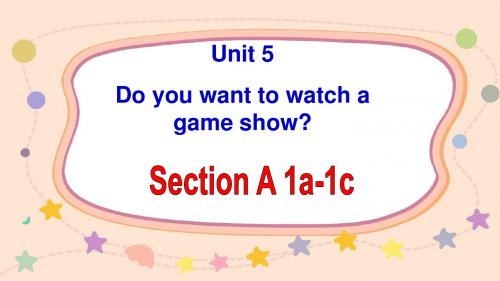
news
新闻
kinds of TV shows
sitcom
情景喜剧
soap opera
肥皂剧
talk show
脱口秀、访谈
game show
游戏节目 知识竞赛节目
1a Match the TV shows with the pictures [a-g].
1.talk show____ e
2.soap opera____ d
1b
Listen and number the shows [1-4] in the order you hear them.
__ 3 talent show __ 4 soccer game
1 talk show __
__ 2 news
1b
再听一遍,填空。
Mark:Hey,Jack, I plan to watch TV tonight. Do you want to join ________ me? Jack: Sue. What do you want to watch? talk shows Mark: Well, what do you think of __________? mind them, but sometimes they can be a bit Jack: I don’t _______ boring. the news Mark: That’s true. Do you want to just watch___________? talent show Jack: I guess so. Maybe we can watch that new____________ stand talent shows, but that after the news. I usually can’t_________ one is quite funny. p.m Mark: OK, sure, but the soccer game starts at 5:00 _______. Jack: Oh, yeah, I want to watch that game.
Unit5+sectionA+grammar+focus+课件
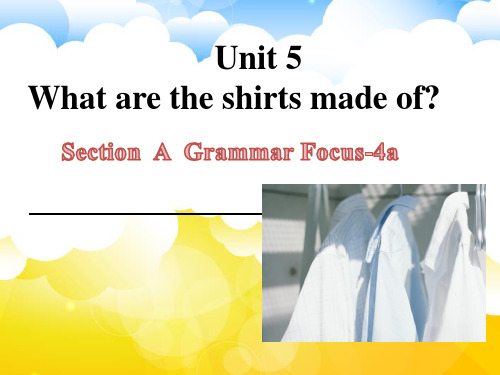
4b
III拓展提高--1.师友练习
Rewrite the sentences using the passive voice.
1. Farmers plant the tea on the sides of mountains.
_T_h_e__te_a__is__p_la_n_t_e_d__o_n_t_h_e_s_i_d_e_s_o_f_m__o_u_n_t_a_in_s__b_y
1.独立阅读,翻译句子;2.师友互助;3.观察标红短语, 总结结构.
I学习语法--2.教师点拨
被动语态 (Passive Voice)
结构: be + V-p.p. 一般现在时的被动语态:
am / are / is + 动词的过去分词
I学习语法--2.教师点拨
主动句与被动句之间的转换
Many people
5. Our family does not use this silver plate very often.
_T_h_i_s_s_il_v_e_r_p_l_a_t_e_i_sn_’_t_u_s_e_d__v_e_ry__o_f_te_n__b_y_o_u_r___ _f_a_m_i_ly_.__________________________________
茶树在山坡上种植。当叶子长好时,人们就手工把它们采摘下来,然后送去加工。
5.Active Voice:People grow tea in Hangzhou. 人们在杭州种茶。
Passive Voice:Tea is grown(by people) in Hangzhou.
提示:
茶(被人们)在杭州种植。
Ⅱ题型讲解--1. 师友练习
人教版八年级上册英语unit5SectionA(2d-3c)的教学设计

Unit 5 Do you want to watch a game show第2课时Section A 2d-3c教学目标一、知识与技能1. 学习掌握重点词汇:discussion, happen, may, expect, joke.2. 进一步复习巩固运用Section A 部分所学的生词和词组。
3. 进一步学习运用所学的知识来陈述自己的看法;学会谈论自己的喜好。
4. 掌握动词不定式结构作动词的宾语这一语法知识;掌握后面接动词不定式作宾语的动词。
二、过程与方法训练法,熟能生巧法,通过练习巩固复习所学知识。
三、情感、态度与价值观学会谈论流行文化,了解各类电视和电视节目的名称和自己的喜好。
注意引导学生们形成正确的文化观念,大力培养学生们的跨文化意识,形成自己独立的个性。
教学重点1. 进一步学习运用所学的句型What do you think of ...?来陈述自己的看法;学会谈论自己的喜好。
2. 掌握动词不定式结构作动词的宾语这一语法知识;掌握后面接动词不定式作宾语的动词。
教学难点1.掌握动词不定式结构作动词的宾语这一语法知识;掌握后面接动词不定式作宾语的动词。
2.掌握以下重点句子:(1)---Do you want to watch the news?----Yes,I do/No,I don`t.(2)---What do you think of talk shows?----I don`t mind them./I can`t stand them./I love watching them.(3) ---What do you plan to watch tonight?---I plan to watch Days of Our Past.(4)---What can you expect to learn from sitcoms?---You can learn some great jokes.(5) ---Why do you like watching the news?---Because I hope to find out what`s going on around the world。
Unit5DoyouwanttowatchagameshowSectionA(1a-2d)课件人教版
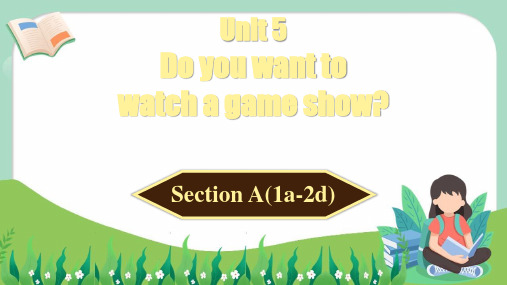
Do you want to watch a game show?
Section A(1a-2d)
game show The Brain
Happy Camp
Reality show
Home With Kids
sports show
talent show
The Voice of China
另一点是... The reason why... ...的原因是
我不同意你的观点
翻译下列句子
(1)我希望每天晚上看新闻。__I _h_o_p_e_t_o_w_a_t_c_h_t_h_e_n_e_w__s_e_v_e_r_y_n_ig_h_t.
(2)他不介意情景喜剧。 ______________________________
Do you plan to watch the news tonight?
Yes. I like watching the news. I watch it every night.
Why?
Because I hope to find out what’s going on around the world.
(5)Sarah 不能忍受情景喜剧。_____________________________ (6)他们想搞清楚那本书更有教育意义。 __T_h_e_y__w_a_n_t_t_o_f_in_d_o_u_t_w__h_ic_h__b_o_o_k_is__m_o_r_e_e_d_u_c_a_t_io_n_al.
2.mind v.汉语意思:_介__意__、__在__乎 介意做某事: mind doing sth 翻译:我不介意开门:__I _d_o_n_’t__m_i_n_d_o_p__e_n_in_g__th__e_d_o_o_r. 介意某人做某事:mind __o_n_e_’s__d_o_i_n_g____sth 翻译:我打开门你介意吗?Would you mind __m_y__o_p_e_n_i_n_g_the door?
人教版八年级英语上册:unit5doyouwanttowatchagameshowsectiona课件

TheyaretalkingaboutTVshows.
2.WhatkindofTVshowsdoSarah’sclassmateslike? Herclassmateslikegameshowsandsportsshows.
3.WhatdoesGracethinkofgameshowsandsportsshows?
1.Sallylikestowatch. thenewsortalkshows
2.LinHuithinksshecan
learnfromsosmitceogmresa. tjokes
3.Sallythinksaremgaomreeshows
educationalthansitcoms.
4.Sallyloves.Shseopalpaonpsetoras
WhatkindofTVshowsisit?
actionmovie
WhatkindofTVshowsiห้องสมุดไป่ตู้it?
scarymovie
soapoperas
Chinesecooking
Whatdoyouthinkoftalkshows? Ican’tstandthem.
Wordsand Expressions
like
don'tmind
不介意,不反对
don'tlike
can'tstand
无法忍受
A:Whatdoyouwanttowatch? B:Whatdoyouthinkoftalk show? A:They'reOK.Idon'tmind them. B.Thenlet'swatchatalkshow.
Unit 5 SectionA 1a-2c教学设计2021-2022学年人教版五四制英语八年级下册

Unit 5 I think that mooncakes are delicious!Section A (1a-2c)教学设计一、设计思路(一)教学指导思想及设计理念《义务教育英语课程标准》提出:“英语课程承担着培养学生基本英语素养和发展学生思维能力的任务。
”及“语音既是交流的工具,也是思维的工具。
”其旨在要求英语课程除了培养学生的语言能力外,还应促进学生核心素养的发展。
在初中阶段的英语教学中,核心素养培养的实现依赖于教师观念的转变和能力的提升,技能教学与核心素养相互促进,使学生在语言能力提高的同时,思维品质、文化品格、学习能力也得到良好发展。
美国学者爱德华·霍尔的互动理论认为:无论是口语语言还是书面语言,都存在着互动。
人与人要进行交际,就必须以互动的形式互相作用,互相影响,因为“互动是生活在集体中的一种功能”。
课堂互动教学有助于培养学生的创新思维能力、阅读素质和学生学习的自信心。
教学应该以学生为主体。
那么,在英语教学中,怎样寻求一种既能体现教师的主导作用,又能发挥学生主体性的教学方式呢?实践证明,构建教学的互动模式是非常必要的,也是十分有效的。
本课具体使用的任务型教学模式,操作如下:第一阶段:课前微课导入加老师的清明节之旅。
通过视频和听故事,导入学生熟悉的话题,为学生后面的学习做好良好的铺垫。
第二阶段:听说任务(听力、讨论)。
此阶段的主要任务是让学生通过文本话题的处理让同学们掌握本节课的主要知识。
第三阶段:拓展提高。
学生在练习过程中实现语言的输出。
(二)教学背景分析(1)教学内容分析八年级下册第五单元的主题是谈论有关节日话题。
本节课的内容Section A 1a-2c 是本单元的第一课时,是一节听说课。
课文材料是关于端午节的一些信息。
要求学生通过谈论中国的传统节日,进一步了解中国的传统文化,并且讨论自己最喜欢的传统节日及其原因。
1a的听前活动提供了一些传统节日的词汇,让学生自己初步了解中国的传统节日,为 1 b、2 a、2b 的听力活动做好话题准备。
Unit5 SectionA( 2a-2d)课件 人教版英语八年级上册

B.to do C.doing D. that he do
C
3.
—I’ll help you whenever you need me. —Good. I’d like _____ me tomorrow.
A.you helping B. that you will help
C.you to help D. that you help
A.mind;mind
B.mind;minds
C.minds;mind
D.minds;minds
Summary
1.A:What do you think of …? B : I can’t stand … \ I don’t mind \ I don’t like… \ It’s … \ They’re C: sb \sth be +adj(+n). (eg: It’s exciting. You’re a little tiger.)
Read 2d and answer the questions. 1. What a kind of TV shows does Grace like? Why 2. What are Sarah’s favorite TV shows? 3. What does Grace think of game shows and sports show? 4. What does Sarah think of game shows and sports show?
9. Do you plan to watch the news tonight?
你今晚打算看新闻吗?
(1)plan vt. & vi.计划, 打算,常用搭配为plan to do sth. 计划做某事
人教版九年级上学期英语课件:Unit 5 Section A 第二课时
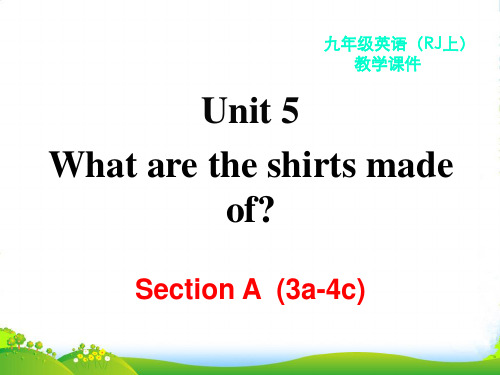
PRACTICE
3. Where were they made? Most of them were made in China.
4. Were there many things made in China in the US? Yes, there were many things made in China in the US.
PRACTICE
1. Where did Kang Jian visit last yBiblioteka ar? San Francisco.
2. What two things did Kang Jian want to buy in the US? A toy car and a pair of basketball shoes.
in China!” Kang Jian thinks it’s great that China is so good at making these everyday things. However, he hopes that in the future China will also get better at making high-technology products that people can buy in all parts of the world.
• 1、teacher affects eternity; he can never tell where his influence stops.教师的影响是永恒的;无法估计他的影响会 有多深远。
• 2、gladly would learn, and gladly teach.勤于学习的人才能乐意施教。 • 3、is not the filling of a pail but the lighting of a fire. • 4、好的教师是让学生发现真理,而不只是传授知识。 • 5、be unboun than untaught, for ignorance is the root of misfortune与其不受教育,不知不生,因为无知是不幸的根源
人教版八年级英语下册Unit5_SectionA(3a-4c)名师课件

4c What were you doing at these times last Sunday?
电筒和收音机都能正常使用。 make sure 的意思时“确认;查明;核实;确保”,
其后可以接句子,或者接介词of后再接宾语,用来引 出需要确认的内容。
2. He went outside with his family and found the neighborhood in a mess. 他和家人出门时,发现周围一片狼藉。 find+宾语+介词短语,可以转化成find+宾语从句的 用法。本句可以转化成: He went outside with his family and found that the neighborhood was in a mess.
3. How can we help each other in times of difficulty? 在面对困难时,我们可以怎样彼此帮助? in times of = at the time of。本句可以转化为:How can we help each other at the time of difficulty?
Fill in the chart. Then ask your partner.
You
Your partner
9:00 a.m. 11:30 a.m.
4:00 p.m.
9:00 p.m.
A: What were you doing at nine o’clock last Sunday morning? B: I was sleeping. How about you? A: I was doing my homework. B: You're kidding!
湘鲁版小学英语Unit5WhatwouldyoulikeSectionA课件

• 2.I'd like some tomatos ,please . _____
• 3.What would you like to lunch ? _____
• 4. I'd like a orange,please .
_____
七、Leave homework:
• 1,把今天所学句型每句抄2遍; • 2,把书本P31的第5部分的作业完成; • 3,提前预习并完成P32页的第6部分。
五、Learn the new sentences:
• 1,What would you like for lunch ? • for lunch :吃午饭。 • 午餐你想吃点什么? • --- I'd like some rice, please. • I'd = I would • 我想吃些米饭。 • 2,I'm hungry . • 我很饿。 • I'm not hungry. • 我不饿。 • 3, Would you like some tomatoes ? • 你想吃些西红柿吗? • ---Yes, please. 好的,谢谢。 • ---No, thanks . 不用,谢谢。
二、Warm-up:
• food song
三、Review the new words:四、Lt's chant :
• 番茄番茄怎么讲,番茄番茄tomato,t-o-m-a-t-o, • 是tomato,tomato,tomato,tomato; • 蔬菜蔬菜怎么讲,蔬菜蔬菜vegetable,v-e-g-e-t-a-
八、Class is over !
unit 5 What would you like ?
B3 Unit 5 Will you be a worker or laborPPT课件

5
6. What has happened due to technological innovation and the division of labor?
7. How did medieval aristocrat deal with their leisure time? And what do modern day laborers do with their leisure time?
What’s the difference between a “worker” and a “laborer”?
4
Global Reading
1. Why, according to the writer, are many people not happy about their jobs?
Unit 5 Section A Will you be a worker or a laborer?
FORFEOIRGENIGLAHNLGAUNAGGUEATGEATCEHAICNHGINAGNDANRDESREEASRECAHRPCHREPSRSESS
1
AIRAFIORRFCOERECNEGEINNGEIENREIENRGINUGNIUVNEIRVSEIRTYTISY
3
If you were given enough money to live the life you want, do you think you will continue with your work? Why? I will stick to my work as a teacher, because I love it… If you don’t want to work, it’s probably not a real work, but a labor. What you probably don’t want to be is a laborer, not a worker.
B3-Unit-5-Will-you-be-a-worker-or-laborPPT课件

Objectives
To talk about work To further understand the text
To apply the phrases and patterns To master the essay writing skill
.
2
Lead-in
Do you want to work? Why or why not? Yes, because * we have to earn our living by working. * work may give us a sense of achievement. * our work may be beneficial to the other parts of society. …. No, because * it’s tiring/stressful to work. * it’s boring to do the same stuff everyday. * It’s really difficult to take a long commute to work.
“Work” stands between labor and play. It’s sth. that one’s interest coincides with the job he is paid to do. It’s a necessary labor from the point of view of the society but a play from one’s personal point of view. Or Generally speaking, “work” and “labor” are the same thing in nature, but whether it’s designated as “work” or “labor” depends on a person’s attitude rather than on the difference between a manual and mental job or between jobs of low or high esteem.
初中英语九年级 Unit 5 Section A 1 (1a-1c)教学设计
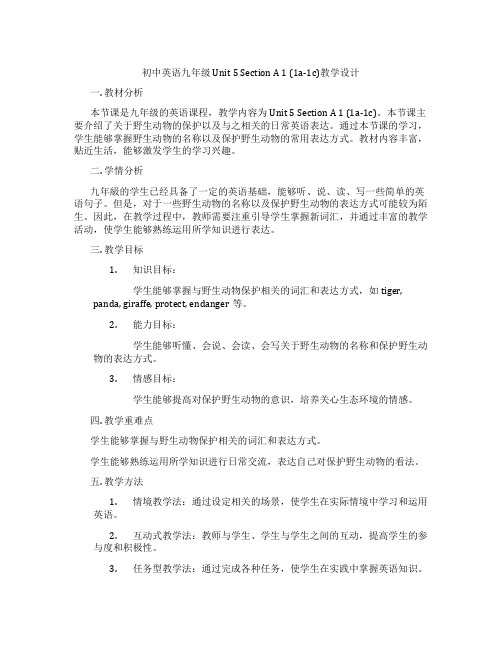
初中英语九年级 Unit 5 Section A 1 (1a-1c)教学设计一. 教材分析本节课是九年级的英语课程,教学内容为Unit 5 Section A 1 (1a-1c)。
本节课主要介绍了关于野生动物的保护以及与之相关的日常英语表达。
通过本节课的学习,学生能够掌握野生动物的名称以及保护野生动物的常用表达方式。
教材内容丰富,贴近生活,能够激发学生的学习兴趣。
二. 学情分析九年級的学生已经具备了一定的英语基础,能够听、说、读、写一些简单的英语句子。
但是,对于一些野生动物的名称以及保护野生动物的表达方式可能较为陌生。
因此,在教学过程中,教师需要注重引导学生掌握新词汇,并通过丰富的教学活动,使学生能够熟练运用所学知识进行表达。
三. 教学目标1.知识目标:学生能够掌握与野生动物保护相关的词汇和表达方式,如tiger, panda, giraffe, protect, endanger等。
2.能力目标:学生能够听懂、会说、会读、会写关于野生动物的名称和保护野生动物的表达方式。
3.情感目标:学生能够提高对保护野生动物的意识,培养关心生态环境的情感。
四. 教学重难点学生能够掌握与野生动物保护相关的词汇和表达方式。
学生能够熟练运用所学知识进行日常交流,表达自己对保护野生动物的看法。
五. 教学方法1.情境教学法:通过设定相关的场景,使学生在实际情境中学习和运用英语。
2.互动式教学法:教师与学生、学生与学生之间的互动,提高学生的参与度和积极性。
3.任务型教学法:通过完成各种任务,使学生在实践中掌握英语知识。
六. 教学准备1.教学素材:教材、多媒体课件、图片、卡片等。
2.教学设备:投影仪、计算机、音响等。
3.教学环境:教室布置成动物园的场景,增加学习氛围。
七. 教学过程1.导入(5分钟)教师通过展示一些野生动物的图片,引导学生谈论自己喜欢的动物,从而引入本节课的主题。
2.呈现(10分钟)教师展示多媒体课件,呈现本节课的主要词汇和句型,如tiger, panda, giraffe, protect, endanger等,并通过图片和卡片帮助学生理解和记忆。
初中英语_unit5Ithinkthatmooncakesaredelicious!SectionA(3a-3c)教学课件设计

Chang’e became very _li_g_h_t __ and f_le_w____u_p__ to the moon.
Hou Yi was __s_o__ sad _t_h_a_t__ he _c_a_ll_ed__ o_u_t___ her name to the moon.
__3__ Hou Yi planned to drink the medicine with his wife.
Group Work Try to explain the mind-map.
②thanked gave
①shot down
③
⑦calleຫໍສະໝຸດ outplanned to
laid out
___________________________________
Report: _________________________________ ________________________________________ ________________________________________
shot down the nine suns and saved the people on the earth
planned to drink the medicine with his wife.
refused to give Pang Meng the medicine and drank it all
(2)熟悉阅读策略,如寻读、找关键词、理解大意、了解重 点细节、评价阅读内容等;
- 1、下载文档前请自行甄别文档内容的完整性,平台不提供额外的编辑、内容补充、找答案等附加服务。
- 2、"仅部分预览"的文档,不可在线预览部分如存在完整性等问题,可反馈申请退款(可完整预览的文档不适用该条件!)。
- 3、如文档侵犯您的权益,请联系客服反馈,我们会尽快为您处理(人工客服工作时间:9:00-18:30)。
While Jenny was shopping, Mary took the car to the car washing.
Jenny was shopping when Mary took the car to the car washing.
While was was
When
While
was was was
【活学活用】
①昨天我给你打电话了, 但你没接。 I called you yesterday, but you didn’t .
答案: pick up
②My mother A. picks me out C. picks me up from school every day. B. picks out me D. picks up me
②Mary was talking on the phone
at the door. A. while B. before C. when
someone knocked
D. after
2. I got to the bus stop but I still missed the bus.
我到了车站但我仍然错过了公交车。 【自主领悟】get意为“到达”时, 是不及物动词, 后面直接跟
storm stormy
sunny
weather forecast
Presentation
rainstorm
lightning
wind
Where were the people at the time of the rainstorm?
d I was on the street. 1. _______ I was in the library. 3._____ b a I was in my house. 4. _____ c I was at the bus stop. 2. ______
二. while 与when 辨析
1. while “当„„时候”, 后面跟延续性动词,多 用进行时态。 2. when “当„„时候”, 后面跟延续或非延续 性动词,多用过去时态。
知识点精讲
1. ①What were you doing when the rainstorm came? 当暴风雨来临时, 你正在干什么? ②So while you were sleeping, I called Jenny and she helped me. 因此当你在睡觉时, 我给珍妮打了电话, 是她帮助了我。
Interview
What were you doing at 9:00am/11:30am/1:00pm/6:00pm/...
last Sunday? Interview your partner. A:What were you doing at st Sunday morning?
3
1
2
4
5
was looking got had/ate
was waiting ran
1. What was the weather like before the heavy rain started? There were strong winds and black clouds making the sky very dark. /It’s windy and cloudy. __________________________________________________ 2.What was the neighborhood like after the storm? The neighborhood was in a mess. Fallen trees, broken windows and rubbish were everywhere. ________________________________________________
B:He was reading.
A: What was the woman doing at the time of the rainstorm? B:She was waiting for the bus.
A: What was the man doing at the time of the rainstorm? B:He was walking home.
—Yesterday afternoon.
A. reach B. get C. arrive D. come
3. I called at seven and you didn’t pick up. 我七点(给你)打电话, 但你没有接。 【自主领悟】pick up意为“接电话”, 是动副结构。当宾语是 代词时, 放在pick up中间, 当宾语是名词时, 放在pick up中间 或后面。 例如: I called you last night. Why didn’t you pick up? 昨晚我给你打电话了。你为什么不接电话?
【归纳拓展】pick up的其他含义 (1)收听(广播), 接(人), 取(某物)。例如:
Pick me up at the hotel. 到旅馆来接我。
(2)(用车)接(人或物); (车辆)中途搭(人)。 例如: The train stopped to pick up passengers. 火车停下来搭乘客。
新目标八年级
13-14下学期
Unit 5 What were you doing when the rainstorm came?
Section A
Lead in
snowy snow rain rainy
shower showery cloud cloudy
weather
wind
windy
sun
【温馨提示】
后接地点副词 , 如 here, there, home 等时 , 去掉介词 , 即 arrive/get/reach+地点副词。
【活学活用】 ①Please write to me as soon as you A. get to C. arrive ②—When did your aunt B. reach to D. come in Shandong? your school.
on the street
A: What was the girl doing at the time of the rainstorm?
B:She was doing her homework.
A: What was the boy doing at the time of the rainstorm?
地点名词时, 要加介词to。例如:
How can I get to the nearest supermarket? 我怎样才能到最近的超市?
【归纳拓展】表示“到达”的三种常用方式
(1)arrive意为“到达”, 是不及物动词, 后跟地点名词时, 要加
介词 in 或 at 。 arrive in+( 国家、城市等大地方名称 ); arrive at+(工作单位、站点等小地方名称)。例如: My uncle arrived
reported
was putting pieces of wood over the windows.
was helping his mom make dinner
fell asleep was dying down.
—What
were you doing at eight last night? —I was taking a shower.
—What
was she doing at the time of the rainstorm? —She was doing her homework.
—What
was he doing when the rainstorm came? —He was reading in the library when the rainstorm came..
—What
was Ben doing when it began to rain heavily? —When it began to rain, Ben was helping his mom make dinner.
—What
was Jenny doing while Linda was sleeping? —While Linda was sleeping,Jenny was helping Mary with her homework.
eg.
While John was playing the piano, Mary left the house. John was playing the piano when Mary left the house.
While John was cleaning his room,Mary turned on the radio. John was cleaning his room when Mary turned on the radio.
in Shanghai last night. 我叔叔昨晚到的上海。
(2)get to后接地点名词。例如: He got to school at 7: 00 this morning. 今天早上他7点到的学校。 (3)reach意为“到达”, 是及物动词, 后面直接跟地点名词。例 如: When did you reach America? 你什么时候到的美国?
B:I was .... How about you? A:I was....
要点解析
一. 过去进行时
1.含义: 表示过去某一时刻或某一段时间正在进行的动作 (这一特定的过去时间除有上下文暗示以外, 一般 用时间 状语来表示。)
